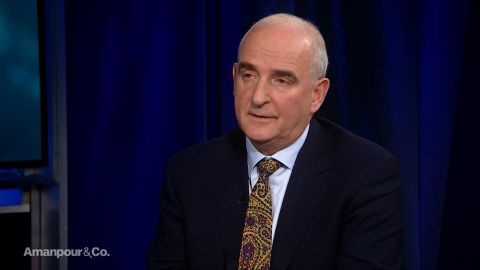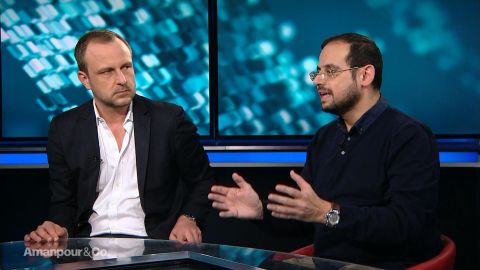Read Transcript EXPAND
ROGER COHEN, COLUMNIST, THE NEW YORK TIMES: I don’t think like President Trump, you can criticize NATO to the degree he has and even suggested the United States could leave NATO, give the impression that you’re more at home with dictators than you are with democratic leaders, elected leaders like Angela Merkel and not expect there to be some response. And it was very evident I think this week, both in Munich and to some degree in Warsaw where the Europeans are thinking again.
CHRISTIANE AMANPOUR: Well, you wrote in your latest column while you were in Munich and subsequent to that conference, you wrote that it was a little bit like a requiem for the West. I mean that’s basically a funeral mass for the dead.
COHEN: Yes.
AMANPOUR: It’s dire.
COHEN: Well, I think it is pretty dire. Look, it’s not all President Trump. The balance of power in the world has been changing for more than a decade. China is rising. India is rising. Pax Americana had a good run. It couldn’t last forever. But President Trump —
AMANPOUR: Are you saying it’s gone?
COHEN: Yes, it’s gone. I think it’s going. It’s going. I think it’s gone. I mean I think President Trump has made clear that the United States doesn’t any longer want to be — wants to underscore, underwrite the world’s security. So that in that sense, I think it’s gone. Yes. And I think that’s what we felt this week. I mean to see Americans in Munich which is kind of the temple of Western unity agrees it with such coldness suggests to what degree Pax Americana has eroded.
AMANPOUR: What — you are talking about the now sort of viral clip of Vice President Mike Pence speaking — doing his piece there and saying, “I bring you greetings from the 45th president” and there’s like a deafening silence.
COHEN: Yes. It was very strange there, Christiane. I mean it was a very strange speech. It was strange for its extraordinary obsequiousness toward President Trump who is mentioned in every second sentence. There was a kind of frostiness in the room. There was an arrogance about Vice President Pence in the way that he just instructed the European allies to leave the Iran nuclear deal, the so-called JCPOA. And, of course, Europe — this is an agreement that’s in trying to an international law through United Nations resolution and Europeans think it’s working. They think it’s keeping Iran from becoming nuclear.
AMANPOUR: On the frostiness and weariness, I mean we talked to Senator Chris Coons. He was also in Munich. He came through here. I talked to him yesterday. And he said that actually, they were leading the largest congressional delegation ever so they were trying to really send a signal certainly from the legislative branch of the United States government that America was still in it with its transatlantic allies. Did that convince people like Angela Merkel or others there?
COHEN: Well, there was a large delegation. And former Vice President Joe Biden spoke and said we will be back. But the sense you have is that the United States is no longer there
About This Episode EXPAND
Christiane Amanpour speaks with Peter Neumann & Aimen Dean about the aftermath of ISIS’s defeat; and Roger Cohen about European/U.S. relations. Michel Martin speaks with Kate Bowler about her new memoir “Everything Happens for a Reason: And Other Lies I’ve Loved.”
LEARN MORE


